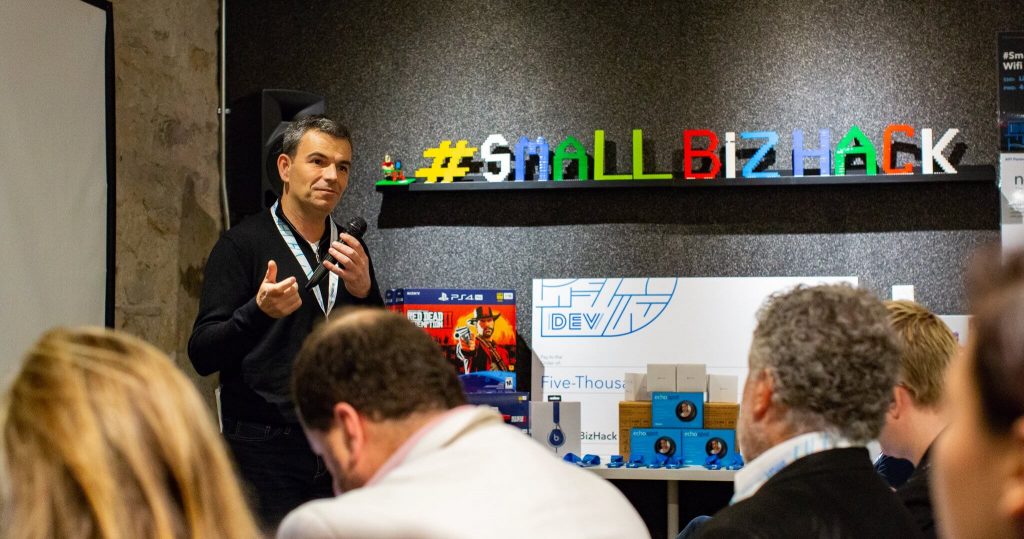At QuickBooks Connect, Intuit’s annual partner conference, Intuit Canada president Jeff Cates announced multiple new additions to the company’s QuickBooks Online product. Chief among them were features leveraging AI and machine learning.
BetaKit sat down with Cates during QuickBooks Connect to learn more about Intuit’s foray into AI and machine learning and their capacity to democratize the value from financial data.
From compliance to financial coach
Cates said the two primary benefits of AI for Intuit’s clients are the removal of mundane work such as compliance tasks and the generation of actionable insight through forecasting. While the former is a big time saver, the latter is a “big evolution for the industry,” and requires both individual company data and anonymized aggregate data from other businesses.
“Historically, accounting was a compliance industry,” Cates said. “You entered data and spat out reports. Usually, it was done post-mortem for things like tax. What’s happening now is we’ve drastically removed the work bookkeepers, and to some extent accountants, used to do because of automation.”
“Small businesses often have to make decisions on hunches,” Cates said. “Just getting the data in the right spot has massive impact.”
The time improvements through automation combined with actionable insights offer accountants and bookkeepers the opportunity to become “coaches and consultants,” a shift Cates described as “phenomenal for the industry, because most people want to have that impact. And who better than them, because often they are dealing with hundreds of small businesses. Their ability to help is phenomenal.”
Like with many other industries, the benefits of automation also come with new questions and concerns. Cates admitted that some in the financial services space may worry that automation removes a well-trodden path to revenue, requiring a shift not only in technology but in education. The president said that current educational structures for accounting and finance professionals angle heavily towards manual compliance methods and don’t often get to high-value business strategies.
To help this educational shift, Intuit announced, at QuickBooks Connect, a partnership with Futurpreneur to educate entrepreneurs on managing finances with 21st-century technology. The company already works with many universities and colleges to train accounting students on strategic financial analysis.

On democratizing innovation
Cates said that QuickBooks’ recent strides in financial analytics using machine learning are in service of helping entrepreneurs make better decisions. He described a recently announced QuickBooks update to its integrated tax product, which allows users to connect different information sets – expenses, income, and tax projections – into one screen.
“Something historically only available to large companies can be made available to small business,” he said. “Since data goes right to the tax app you can run different scenarios and immediately, within the app, see impact on cash flow.”
QuickBooks also announced the ability to provide benchmarking based on other entrepreneurs with similar businesses on the QuickBooks platform. Combined together to provide business intelligence to even the smallest of businesses, Cates believes the real opportunity lies in democratizing innovation.
AI and machine learning means insights “historically only available to large companies can be made available to small business.”
“Small businesses often have to make decisions on hunches,” he said. “Just getting the data in the right spot has massive impact. Surfacing those insights will enable businesses to leverage the power of many – all different people on the platform who look like them – to help them make better decisions.”
Cates further said he sees a future where data from other providers is connected to bring even higher quality insights and preemptive questions to the table for entrepreneurs.
It starts with open banking, a movement where financial institutions offer aggregate data via a public API. Such an integration would allow the current benchmarking to scale to billions of data points across multiple platforms.
“What happens is you’ll start to pull in data and services from other applications,” Cates said. “chata.ai is a great example. It could pull in other sources of data to help you get a picture of what’s happening with your business. For example, trying to get a read of why sales is trending in a direction – it can pull data from the weather network to see the correlation between sales and weather. It can pull data and call on services and stitch all that together to get deeper insights.”
As democratization of traditional services pushes forward and customers demand more predictive insights, AI and machine learning will be the new tools of the trade. Service providers used to the old model may be hesitant, but the opportunity is so great that financial service providers for small businesses, as Cates put it, simply “can’t ignore it. They have to embrace it.”


